Related Research Articles
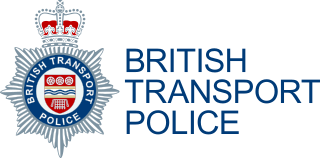
British Transport Police is a national special police force that polices the railway network of England, Wales and Scotland. The force polices more than 10,000 miles of track and more than 3,000 stations and depots.
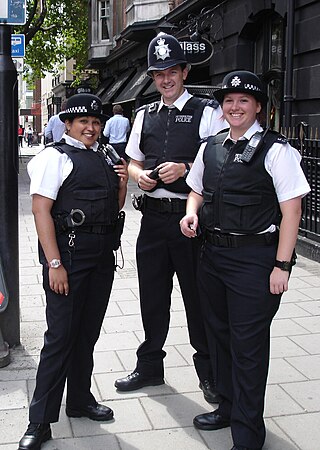
Law enforcement in the United Kingdom is organised separately in each of the legal systems of the United Kingdom: England and Wales, Scotland, and Northern Ireland. Most law enforcement duties are carried out by those who hold the office of police constable of a territorial police force.
Special police usually describes a police force or unit within a police force whose duties and responsibilities are significantly different from other forces in the same country or from other police in the same force, although there is no consistent international definition. A special constable, in most cases, is not a member of a special police force (SPF); in countries in the Commonwealth of Nations and often elsewhere, a special constable is a voluntary or part-time member of a national or local police force or a person involved in law enforcement who is not a police officer but has some of the powers of a police officer.
A Police Community Support Officer, or as written in legislation Community Support Officer, is a uniformed member of police staff in England and Wales, a role created by Section 38(2) of the Police Reform Act 2002, which was given Royal Assent by Queen Elizabeth II on 24 July 2002. They are not warranted, but hold a variety of police powers and the power of a constable in various instances by the forty-three territorial police forces in England and Wales and the British Transport Police.
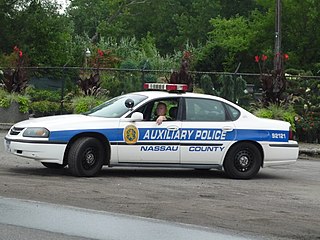
Auxiliary police, also called volunteer police, reserve police, assistant police, civil guards, or special police, are usually the part-time reserves of a regular police force. They may be unpaid volunteers or paid members of the police service with which they are affiliated.

A law enforcement officer (LEO),, or police officer or peace officer in North American English, is a public-sector or private-sector employee whose duties primarily involve the enforcement of laws, protecting life & property, keeping the peace, and other public safety related duties. Law enforcement officers are designated certain powers & authority by law to allow them to carry out their responsibilities.
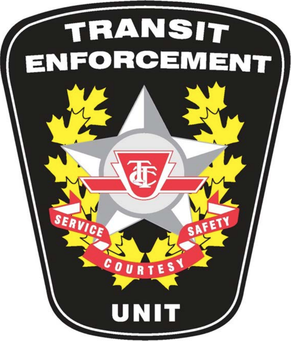
The Transit Enforcement Unit is a special constabulary maintained by the Toronto Transit Commission (TTC) in Toronto, Ontario, Canada. First established in 1997, the Unit consists of special constables and provincial offences officers, referred to internally as transit fare inspectors. The unit's special constables have the full powers of a police power on or in relation to TTC property, and, as of 2023, the unit employs 101 special constables out of an authorized complement of 145.

Isle of Man Airport is the main civilian airport on the Isle of Man. It is located in the south of the island at Ronaldsway near Castletown, 6 nautical miles southwest of Douglas, the island's capital. Along with the Isle of Man Sea Terminal, it is one of the two main gateways to the island. The airport has scheduled services to the United Kingdom and the Republic of Ireland.
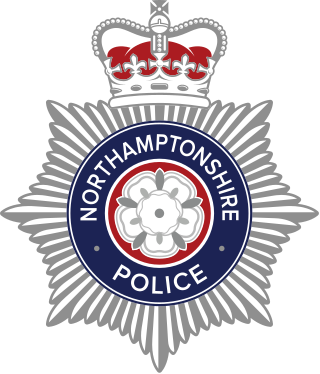
Northamptonshire Police is the territorial police force responsible for policing the county of Northamptonshire in the East Midlands of England, in the United Kingdom.

Wandsworth Parks and Events Police is a Wandsworth Borough Council service responsible for the routine patrolling of the parks, commons, and open spaces within the London Borough of Wandsworth, which has more green spaces than any other inner London borough. It also enforces byelaws, dog control orders, and other park regulations, and provides policing for special events. Its lineage may be traced to a 1984 foundation, although the present body dates from 2012, and was rebranded in 2015 with its current name and responsibilities.
The Royal Borough of Kensington and Chelsea Parks Police is a body of constables responsible for policing the parks and open spaces of the London Borough of Kensington and Chelsea. In 2013, it was merged with the Hammersmith and Fulham Parks Constabulary to form the Parks Police Service. Then, in July 2019 The Royal Borough of Kensington and Chelsea Parks Police moved away from The London Borough of Hammersmith and Fulham Parks Constabulary, once again becoming a single service.

The Oxford University Police, or Oxford University Constables, was the private police force of the University of Oxford between 1829 and 2003. They carried warrant cards and were empowered to act as police officers within the University precincts and within areas of Oxford within four miles of any University building. As of 2001 the force existed as a private constabulary with 40 sworn constables. They were widely recognised for the bowler hats which formed part of their uniform, and formerly had the duty of patrolling outside the Examination Schools alongside the University Proctors, the officials responsible for discipline in the University. They were abolished by the University Council in 2003.

The Los Angeles Airport Police is the airport police division of Los Angeles World Airports (LAWA), the city department that owns and operates two airports in Los Angeles: Los Angeles International Airport and Van Nuys Airport. It has more than 1,100 officers, security, and staff. Though it works very closely with the Los Angeles Police Department (LAPD), LAXPD is a separate entity, primarily due to the airport police having specialized training and funding resources.

The Port of Portland Police is a non-Home Office ports police force responsible for the Port of Portland in Dorset, United Kingdom.
The Airport Police Service (APS) is a small private police force responsible for providing general security and aviation security duties at the three state airports in Ireland: Dublin Airport, Cork Airport and Shannon Airport. The Airport Police Service was first founded in 1936 in Dublin Airport and first became "Authorised Officers" under section 15 of the Air Navigation and Transport Act 1950 for the Minister of Transport.
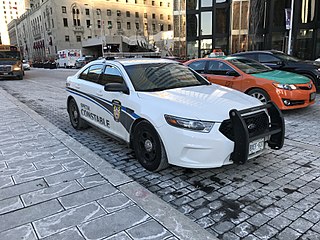
A special constable or special police constable can refer to an auxiliary or part-time law enforcement officer or a person who is granted certain (special) police powers.
Airport policing in the United Kingdom has taken many forms since the rise of scheduled airline services in the post-war period. Policing at major civilian airports was the responsibility of specialist constabularies operated by three central government departments until 1974, when the rise in international terrorism saw armed police from territorial police forces deployed to major airports under the provisions of the Policing of Airports Act. As more minor airports grew in size, they too switched to armed police provided by local police forces. However, the funding agreements for the provision of such services varied wildly from airport to airport, leading to disagreements between airport operators and chief constables. A new regime, the Airport Security Planning Framework, came into force in January 2010, and brought airport operators, airlines and police forces together to develop joint security and policing plans for all passenger airports.
In the United States, there is no consistent use of the office of constable throughout the states; use may vary within a state. A constable may be an official responsible for service of process: such as summonses and subpoenas for people to appear in court in criminal and/or civil matters. They can also be fully empowered law enforcement officers. Constables may have additional specialized duties unique to the office. In some states the constable is an elected or appointed position at the state or local level of local government. Their jurisdiction can vary from statewide to county/parish and local township boundaries based on the state's laws.
The Liverpool Airport Police is a defunct police force of the United Kingdom, formerly responsible for policing Liverpool John Lennon Airport, in Liverpool, England.
References
- 1 2 3 4 "Aviation Security Officers Sworn In". Isle of Man Airport. Archived from the original on 23 February 2008. Retrieved 23 September 2014.
- ↑ Open buildings report; see section "Security".
- ↑ "Airport security jobs in jeopardy".
- ↑ "Aviation Security Team". BBC. 16 March 2007. Retrieved 23 September 2014.
- 1 2 3 4 "Aviation Security Officer Job Description" (PDF). Isle of Man Government, Dept of Transport. Retrieved 23 September 2014.[ permanent dead link ]
- 1 2 Tribunal report at IOM Today Archived 2016-03-04 at the Wayback Machine .